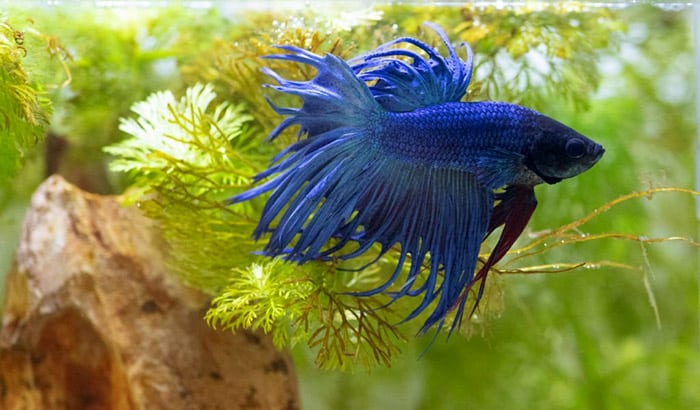Bettas are a type of fish that can be found in many pet stores. They make popular pets, but many do not know nearly enough to care for them properly.
To keep their betta fish healthy and happy, we should know what to feed them, how to prevent them from feeling depressed and frustrated, and the list goes on.
In this blog post, we will discuss the most common ways bettas die. It is to show how we can prevent that from happening to our own pets.
What can make the betta fish die?
Water Conditions
Bettas are very sensitive to water quality, and even a slight change can cause them stress.
Ammonia, nitrites, and nitrates are all poisonous to bettas and can lead to death if the levels are too high.
As the pH level is not consistent it can also hurt betta fish. Any sudden change from the ideal level of pH 7 might give the fish a tremendous amount of stress and cause sudden death.
Therefore, make sure to test your water regularly and keep it clean to prevent your betta from getting sick.
Bacterial Infections
Betta fish are also susceptible to bacterial infections, which can be deadly if not treated promptly. Common signs of a bacterial infection include:
- Cloudy eyes
- Lethargy
- Patchy sores, ulcers on the body
- Loss of colors
- Frayed fins
Suppose you notice any of the above symptoms happening to your betta fish. In that case, it is best to use antibiotics to treat them.
You can isolate the fish infected by bacteria in a clean and small tank. The short quarantine with clean water and medical dosage will soon nurse the infected betta fish back to health.
Just make sure you change the water often when treating the fish. Also, you can add fungal medication if necessary.
Viral Infections
Viral infections are another leading cause of death in betta fish. Some of the most common viruses include the betta paralysis virus and the velvet disease virus. Symptoms of a viral infection include
- Lethargy
- Loss of color
- Loss of appetite
- Labored breathing
- Difficulty swimming
To treat such infections, you can do the following steps:
You can change the water in the aquarium to clear out the parasites. Also, it is recommended to increase the temperature at a very slow rate until it reaches 83 to 84 °F within a day. Make sure to dim the light to decrease the growth rate of the infected organisms.
Recommended chemicals treatments for these infections include copper sulfate, aquarium salt, and medical dosage for the infection.
Poor Nutrition
Like all animals, bettas need a balanced diet to stay healthy. If they don’t get enough nutrients, they can become sick and even die. Bettas should be fed a variety of foods, including pellets, freeze-dried food, live food, and vegetables.
Betta fish might also die from overfeeding, being fed the wrong or expired food. It requires owners to be mindful when giving betta fish the amount of food suitable for their weight and size.
Inadequate Housing and Overcrowding
Betta fish need at least 2.5 gallons of water to be happy and healthy. If they are kept in a bowl or tank that is too small, they will experience major stress.
Overcrowding is another issue that can be deadly for bettas. These fish are territorial and need their own space. If they are kept in a tank with many other fishes, they will become stressed and might die.
Therefore, it is important for owners to find proper tank capacity when they plan to add more fish.
Temperature
Betta fish are tropical fish and need warm water to survive. If the water is too cold, they will go into shock and die.
The ideal temperature for bettas is 76-82 degrees Fahrenheit. Also, when you plant to raise the temperature, do so slowly to prevent sudden shock to your betta fish.
Disease
Like all animals, bettas can get sick from time to time. If not treated quickly, diseases can be deadly. Some common betta diseases include fin rot, velvet disease, and swim bladder disease.
Usually, we can use antibiotics to treat most of these diseases. Owners can separate the sick betta fishes in a tank with good water conditions, including cleanliness, pH level, oxygen, temperature, etc.
You can also contact a trained veterinarian to diagnose the fish and offer the proper treatment.
Accidental Death
Bettas can die from various accidents, including getting sucked into filters, being eaten by other fish, and jumping out of their tanks. To prevent these accidents, keep your betta’s tank clean and secure.
Aggressive Tank Mates
Bettas are peaceful fish, but they can be aggressive towards other fish if they feel threatened. If they are kept with too big or too aggressive fish, they may become stressed and die.
It is important to choose suitable tank mates for betta fish. Here’re some suggestions that you might want to consider:
- Cory Catfish
- Kuhli Loaches
- Trumpet Snails
- Small Tetras
- African dwarf frogs
- Feeder guppies
- Moss balls
Aging
Bettas don’t live forever, and one of the most common reasons they die is simply old age. The average betta lifespan is 3-5 years, but some can live up to 10 years with proper care.
As they get older, they may become more susceptible to illness and disease. Thus, it’s important to keep a close eye on them and take them to the vet at the first sign of any problems.

How do you know when a betta fish is going to die?

A few signs may indicate that your betta fish is nearing the end of its life. These include:
- Lethargy
- Lack of appetite
- Difficulty swimming
- Floating upside down
- Discoloration
- Opaque, milky appearance to the body
- Fraying fins
- Labored breathing
Another sign that your betta fish may be dying is if it starts to float upside down at the water’s surface. This condition is called “buoyancy problems,” and a build-up of gas often causes it in the fish’s stomach.
In some cases, betta fish may also exhibit what is known as “the death dance.”
If you notice any of these signs, it’s essential to take your betta fish to the vet for a check-up. The vet will be able to give you a more accurate prognosis and help you make the best decision for your fish. With proper care and treatment, your betta fish may be able to live a happy and healthy life.
Conclusion
As you can see, many different things can cause betta fish to die. By understanding the most common causes of death in bettas, you can take steps to avoid them and help your fish live a long and healthy life.
Have you had any success keeping your bettas alive? Let us know in the comments below.




